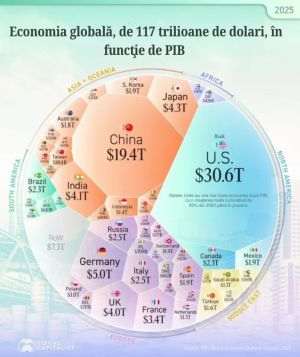The new fiscal measures provided by law 296/2023 will negatively impact over 75% of companies and will lead to an increase in the phenomenon of undeclared work, according to the Confidex study for the 2nd semester of 2023, presented yesterday by Andrei Cionca, CEO of Impetum Group , the company that carried out the respective work, during which the managers of 550 companies were surveyed, between September 27 and October 16.
Andrei Cionca specified: "36% of the respondents claim that the new fiscal measures will have large and very large negative effects on the activity of the company they manage, and 39% state that the company they manage will have an average impact. (...) 81% of managers believe that there will be an increase in the phenomenon known as undeclared work, due to the new fiscal measures. Moreover, the new tax measures are the main concern of 31% of the respondents, followed by the tax increase, which is viewed with concern by 28% of the managers".
Mr. Cionca stated that, from the prepared paper, it appears that the economy of our country seems disconnected from the major geopolitical events - the war in Ukraine and the conflict in the Gaza Strip - and from the economic recession that some states in Western Europe entered, as they did not have an impact on the activity companies, with entrepreneurs claiming that most of the negative effects are caused by the domestic legislative framework and frequent tax changes.
According to the Confuidex study for the second semester of the current year, following the new fiscal measures, entrepreneurs are worried about salary increases, the decrease in profit, and 42% of respondents say that they expect an accumulation of debts.
Andrei Cionca showed: "Only 9% of the respondents think they will enter insolvency or bankruptcy in the next six months. However, we notice that in the Romanian economy the degree of indebtedness is increasing at a general level, and therefore we believe that the answers of the entrepreneurs regarding the entry into insolvency show their overconfidence in the company they lead. Moreover, according to the study, only 29% of the responding entrepreneurs claim that the situation of their own company has worsened in the last six months, while 70% state that the national economy is in decline, which shows that company representatives have more confidence in their own companies than in the national economy".
• Greater degree of stability among companies with turnover over 10 million euros
The Confidex study also reveals that, amid the new tax measures, the confidence index of entrepreneurs fell in the second semester of the current year to 48.1 points, compared to the 50.2 points recorded at the end of the first semester of 2023.
The representative of Impetum Group stated: "The results of the Confidex study reflect again, in a realistic manner, the state of mind in the Romanian economy. If in previous editions we talked about a series of factors that sharpened the senses of Romanian managers, such as the pandemic, the war in Ukraine, inflation or the labor force crisis, this time, the fiscal news left their mark on the perception and expectations of managers. The optimism of the first part of this year has dissipated, giving way to caution. We observe that the mood is depreciating in the business environment and pressures regarding salary increases and a decrease in profit are anticipated. Romania's economy is the worst viewed by Romanian managers, compared to the European economy and the global economy. The confidence index is 4 points higher than in the second half of last year - when energy price increases and inflation took their toll - and lower than in the first half of 2023, although on a European level, many states had entered recession economic. Only 26% of respondents are relaxed about the state of the Romanian economy, and the average mood drops from 5.5 in the first semester to 4.8 in the second semester. At the level of economic sectors, only the managers of the energy, IT and service companies are on the positive side of confidence in the national economy; the rest are in the red. However, if we look segmented, it is observed that the value of the mood index of the managers who run large companies, with a turnover of more than 10 million euro, is more than 10% higher than in companies with a turnover of less than 1 million euro. These figures indicate a greater degree of stability of large businesses in the face of environmental uncertainties. It is a signal that indicates the need for investments in the direction of strengthening the position in the market for companies whose strategic objectives are development and scaling".
After the fiscal measures, other concerns of Romanian entrepreneurs for the next six months, according to the cited study, are the lack of working capital and cash flow (15% of respondents, in strong advance from 5% at the beginning of the year), the increase in the cost of raw material and utilities (12%, up from 9%), declining sales, reduced customer numbers and orders (28%, up slightly from 27% in the first half of this year) and labor shortages (15% , which is, however, down from 27%).
• Alternative sources for business financing
Regarding the outlook on the national economy in the next six months, 62% of managers believe that it will get worse and are already preparing for more difficult working conditions, or even a recession, which would follow the trend of the markets in the region and the euro zone .
In this economic context, 55% of Romanian businessmen declare themselves open to exploring alternative sources of financing, beyond internal financing methods (profit reinvestment or capital injections from shareholders). Cost control and reorganization also represent an opportunity for 10% of managers, on a par with accessing European funds. Given that access to credit is problematic for a quarter of the managers participating in the study, they are open to other sources of financing such as investment funds, business angels or other entrepreneurs, oriented to invest in already established companies. 80% of the managers who participated in the Confidex study have a good or very good opinion of these sources of business financing.
Regarding the financing of companies through listing on the stock exchange, Andrei Cionca showed that although BVB seems disconnected from the situation of the national economy, 40% of the managers surveyed believe that there is a risk in the next six months that the stock market will fall by 25% or more, while 40% believe that this risk is very low, 7% claim that this risk does not exist, and 14% did not answer the question related to the stock market situation in our country.
Related to other opportunities targeted by Romanian managers, the Confidex study shows that among them is the increase in market demand (18% of managers, compared to 15% in the first semester of 2023), product diversification and development (15%, increasing from 9%) and easier access to markets and international expansion (down from 19% to 11%).
We note that in the study prepared by Impetum Group, of the 550 surveyed companies, most are from trade - 155 companies, 150 economic agents have a turnover of over 10 million euros, 71 have a turnover between 5 and 10 million euros, 154 have the respective figure between 1 and 5 million euros, and 176 companies have annual business between 100,000 euros and one million euros.























































